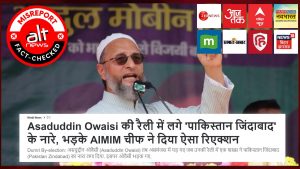A few days ago, media outlets reported that 400 mosques and madrasas in Uttar Pradesh’s Rampur were operating on stolen electricity. According to these reports, the electricity department issued notices to those running the mosques and madrasas asking them to install electricity connections within a week. If they failed to comply, action would be taken after an inspection campaign.
On September 25, Live Hindustan reported that more than 400 mosques and madrasas were running on stolen electricity. The report included a statement by executive engineer Bhishma Singh Tomar who stated, “About 400 mosques and madrasas in the city do not have electricity connections. A list of these establishments have been sought from the police. There is an appeal to all of them to install an electricity connection within a week. If they fail to do so, their electricity connection would be cut and charges would be filed under electricity theft. (Archived link)

Another report by Live Hindustan dated September 26 mentioned the use of stolen electricity by more than 400 mosques and madrasas. (Archived link)

Navbharat Times also published a report with a similar claim on September 26. (Archived link)

RSS mouthpiece ‘Panchjanya’ also claimed that mosques and madrassas in Rampur were issued notices over electricity theft. (Archived link)

Fact-check
Alt News performed a keyword search to get to the bottom of this claim. This led us to an article by The Times of India dated September 25. According to this article, 59 temples and 115 mosques in Uttar Pradesh’s Rampur were asked to get electricity connections. This article has been written by journalist Arvind Chauhan.

We saw that Chauhan had called the claim made by Live Hindustan ‘misleading’ in a September 26 tweet. He also shared the list of 59 temples and 115 mosques in this tweet.
🧵
Story looks misleading.
The discom has sent advisory to 59 temples & 115 mosques to get power connection within a week, as they were engaged in alleged power theft
यूपी के 400 मदरसों और मस्जिदों में हो रहा था यह काम, बिजली विभाग ने जारी किया नोटिस
https://t.co/4oCUSDLQ5W— Arvind Chauhan (@Arv_Ind_Chauhan) September 25, 2022
https://platform.twitter.com/widgets.js
Alt News reached out to Vishal Malik, the zonal secretary of Rampur PVVNL (Paschim Vidyut Vitran Nigam Limited) to gather more information on the matter. He stated that the department had urged all religious places running without power connections to submit applications for electricity connections within a week. This includes both temples and mosques. It is worth noting that the department did not single out mosques in its directive to install power connections. Malik also informed Alt News that executive engineer Bhishma Singh Tomar had shared an advisory on this in a WhatsApp group consisting of local journalists. Along with this, he also shared the list containing details of the 59 temples and 115 mosques, along with their location and operators. Vikas forwarded both these messages to us.

It is worth noting that the text used in the advisory is misleading since it mentions masjids, madrasas, maulvis and the caretakers of the masjid. However, there is no mention of temples or priests anywhere.
The readers can download this pdf file by clicking here. Below is a list of the temples and mosques in the gallery that was sent to the WhatsApp group of journalists.
Where did the ‘400’ figure come from?
As per a Live Hindustan report, executive engineer Bhishma Singh Tomar had called for a report from the police. On this basis, he claimed that 400 mosques were using electricity without power connections. Alt News got in touch with Tomar to gather information on this. He said that the advisory had been issued to both temples and mosques, and not to any one religious community. He added that it was for all religious places which used electricity without a power connection.
When we asked Bhishma Singh Tomar about the list based on which he made the misleading claim about 400 mosques and madrasas using electricity without connection, he replied that he had only one police station list which he had sent to the WhatsApp group of journalists. It includes 59 temples and 115 mosques. He said that by taking a total of four police stations, he estimated that more than 400 mosques and madrasas were using stolen electricity. When we asked him whether any notice had been issued to the operators of the temple and mosques, he said that no one was issued any notice. Rather, it was an advisory that had been circulated.
Overall, executive engineer Bhishma Singh Tomar issued a misleading advisory and made a misleading statement in the media. On the basis of incomplete information, media outlets claimed that only mosques and madrasas in Uttar Pradesh’s Rampur were running on electricity without power connections leading the electricity department to issue a related advisory. In reality, the advisory was issued to all religious places, including temples, to install power connections.
Independent journalism that speaks truth to power and is free of corporate and political control is possible only when people start contributing towards the same. Please consider donating towards this endeavour to fight fake news and misinformation.




